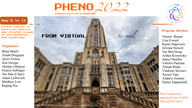Speaker
Description
The $K \to \mu^+ \mu^-$ decay is often considered to be uninformative of fundamental theory parameters since the decay is polluted by long-distance hadronic effects. We demonstrate that, using very mild assumptions and utilizing time-dependent interference effects, $ \mathcal{B} (K_S \to \mu^+ \mu^-)_{ℓ=0}$ can be experimentally determined without the need to separate the $\ell=0$ and $\ell=1$ final states. This quantity is very clean theoretically and can be used to test the Standard Model. In particular, it can be used to extract the CKM matrix element combination $|V_{ts}V_{td}\sin(\beta+\beta_s)|≈|A^2 \lambda^5 \bar{\eta}|$ with hadronic uncertainties below 1%. Additionally, simple New Physics models can significantly enhance $ \mathcal{B} (K_S \to \mu^+ \mu^-)_{ℓ=0}$, making this mode a very promising probe of physics beyond the standard model in the kaon sector. Based on arXiv:2104.06427.

